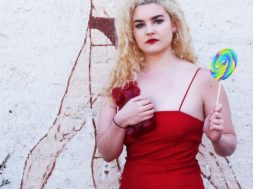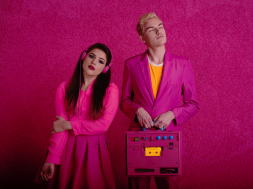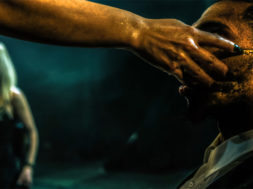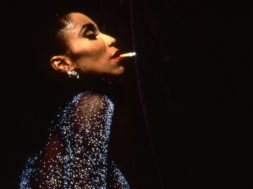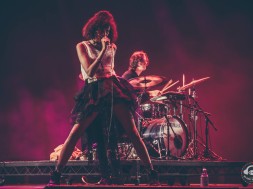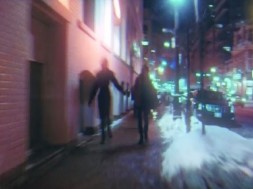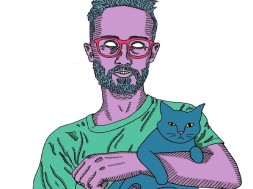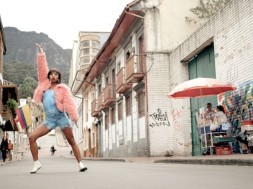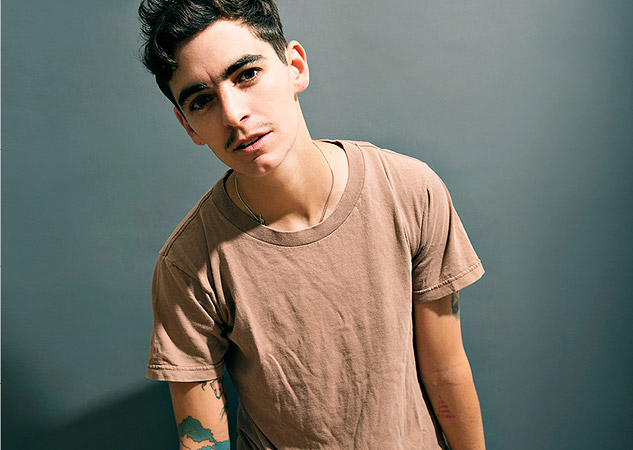![[PRIDE MONTH/INTERVIEW] JD Samson & MEN](https://thesightsandsounds.com/wp-content/uploads/2014/06/tumblr_lyo65ugBVw1qbe88to1_500.jpg)
[PRIDE MONTH/INTERVIEW] JD Samson & MEN
Our Pride Month(s) series has been exploring the ways that queer art and music is developing in an ever changing and supposedly more progressive world. But we don’t just want you to hear our voices here at The Sights and Sounds. Which is why we’re also bringing you a set of interviews featuring queer artists and allies that we feel are really impacting the scene with their music, their activism, and their vision.Not to mention, you know, people who make challenging queer music are just like, inherently hotter, amirite? So why not give them the coverage they deserve….
JD Samson and the associated voices and insanely talented people that compose MEN have all been fearless, queer icons for sometime. Samson, previously of Le Tigre fame, but also for being a truly kickass androgynous gender queer warrior sat down and answered some of our interview questions about the state of queer art, her new album Labor and a few around the bend questions. Samson proved to us that she’s still the explosive bit of artistic revolution in a petite frame that we’ve known her for and that we think her and MEN can be in keeping the queer music scene an exciting, revolutionary place.
A lot of the songs on Labor have shifted to a darker pop, which I deeply love. What do you think about dark pop’s potential to emanate as strong (or stronger) anthemic feeling in people?
I know people like the underdog taking over vibe. I’m not really sure if that’s what comes across on the record, but I think in general, many people have vulnerabilities and fears and I think that is where the record can be appreciated by all.
You’ve mentioned in other interviews that you moved into writing songs with lyrical content for Labor that you wouldn’t even tell your psychiatrist. Has that type of writing always been a part of your private life or did it become a focus in the writing of this album?
I think it has been a part of my private work, unfinished songs, journals, visual art, but i haven’t felt as much of an opportunity to explore presenting that work as I have been in quite democratic bands that generally speak as a community to a community. This record’s development was a bit different and it just came out! Although, if I think far back in time I would consider songs like Viz in le tigre, or even keep on living to take up a similar space at the time for me. I guess my art is personal!
I like to think of art in all its forms as performative in putting off the energy we want returned to us in the world. You came of age on the stage, and have been performing all types of music for years. Do you find the energy you give off performing songs from Labor to have altered the ways your fans interact with you?
I think my relationship to performing my own music has changed, yes. I feel much more safe DJ’ing these days, but I’m not sure why. I think to some extent, its less personal and vulnerable, yes, but I also think I’m learning who I am without the stage. I remember Michael Jackson saying something similar in an interview with Oprah. He said he felt more comfortable on stage than anywhere else. I felt that for a huge part of my career, but in the past few months I have felt really confused about that relationship. I think its really deep, but has a lot to do with exploration, which is a super important part of any human development.
How do you think the shift to darker, intimate pop in your music with MEN on Labor has succeeded in opening the band up beyond the queer community? A lot of these themes seem like they touch the great swath of optimistic but turned around folks out there.
I’m not really sure! I think we have had some success with the love song on the record, All The Way Thru, so I guess that’s pretty cool, and informative about what people want. But I also think that has to do with the fact that its a good pop song and was produced by Yuksek who has a really great fan base and is a great producer! I can only say I made the work I made with not a lot of intention or expectation of what would happen, and it is what it is!
Because, honestly, I’ve been following your career for years, and ‘Deconstruct Me’ instantly struck me in a way that I felt dissolved the barrier I felt between JD Samson as an artist and an intimately understood person. But I’m incredibly introverted like that, so songs like this feel like a secret language of sorts. Was that part of your aim in the more introverted approach you took to writing this LP (outside the altering band composition of MEN that changed the process)?
I really think the introverted style of this record came about out of necessity. We wanted to make a record, but I found most of the time, I was alone. So, what could I do but make the songs about what I was feeling. Some are truly ecstatic, some are personal, political, depressed. I guess there are parts of me that fit in all those places. It was a relief to me, a “labor” to get out who I really am. I’m not sure people really cared about that, but it was cathartic anyways.
Correct me if I’m wrong, but I’ve battled my own strains of self-destructiveness most of my life, and so ‘Deconstruct Me’ came across like an anxious conversation I’d have with myself as I stare out at the world of people and imagine how they’d first destroy me and then rebuild me (likely to my benefit). Not to put words in your mouth, but can you explain the genesis of ‘Deconstruct Me’?
Deconstruct me was a song i wrote in a session with a producer named felix snow. We were writing for another artist, but after a few months, I realized this song was mine, and I was going to put it out. A lot of songs I write are about the duality I face in my life. Not being able to make decisions well… constantly talking to my conscience etc. But I wanted to write a song that worked both as a conversation about my sexuality and people wanting a piece of something i’m not comfortable giving, but also about the reality of being “famous” and people picking me apart constantly because i’m in the public eye. In general its about me trying to find me within this whirlpool of what people want me to be.
Also, ‘Fucked Up’ made me cheer. Not in some schadenfreude kind of way or cheering a fellow inmate of ‘blow one’s life own up’ prison; but in the sheer brazenness of it. It stepped across all the boundary lines of monogamy, polyamory, and the need for sexual expression within the confines of relationships without settling on one thread. You don’t see songs written from that perspective.
This was a big one in therapy! I thought hard about not releasing it, but this song was ME. So I left it on the record and found a way to feel good about giving that to the world. It feels a bit like misogynist Kanye… but I think my fanbase can understand what I’m saying.
In my Pride Month series I’ve been exploring how the positive achievements of the queer rights movement have been creating an increasingly conservative and unyielding perspective by queer individuals on relationships and our social nature. Labor doesn’t seem to take heed of that change in tide, which I deeply appreciate
Thanks!
I come from and hold firm in a radical queer background. How do you think the advancements in the queer rights movement (as mostly defined in the US by the homonormative marriage movement of the last 10 years) and the growing move by queer individuals to copy the same patterns of heteros effects the type of queer music and art created?
I think we are at an interesting moment. There are certainly many sides to every issue, but I think the advancements are altogether good for us. Yes they seem traditional, but I think creating equality is important, whether or not you want to fall into the traditional regime is your decision. I don’t fault people for being themselves, and needing to do things however they feel comfortable. I think its important for me to let people do them. I’m gonna do me.
For instance, there’s an increasingly sex negative perspective in the queer community (well, mostly that of the upper middle class, gay white male perspective that dominates the cultural conversation). Labor, even in its darkest moments is still an incredibly sex-positive album. Is that something you view as part of your art/activism and how do you integrate that into your art as you try to appeal to a wider amalgam of communities?
I guess I don’t really think about it. I’m sex positive, yes. And I do consider that part of my activism, but I don’t talk about it all that much as it can be personal and a bit scary to delve into publicly. I will say that I think a lot of my art is about sex and always has been because i think we should talk about it, and i think creating a positive image for sex is important to me. I will not change the way I talk about sex. In deconstruct me for example “you wanna take me you wanna penetrate me you do everything so you can deflate me. This stones a solid rock you be bottom i’ll be top.”
So, you were my inspiration in realizing I was genderqueer. I love having a rough, rugged, bearded overly muscled traditionally butch outward appearance, but I don’t identify with any traditionally understood within the patriarchy masculine energies or traits internally. So, I wanted to give you a massive thanks in helping me figure out why I was confused about myself for years and years. Outside yourself, who is the biggest trans/gender queer hero for yourself?
Lynnee Breedlove has always been one of my hero’s. I love their constant positive energy and sincerity. Super important in my coming of age.
So, to begin exiting the interview. Let’s finish with a few fun questions. What’s your favorite get it on like Donkey Kong song for the boudoir? I’ll go first, not that’d you feel awkward, but on the off chance that you do, and mine is ‘Holy Ghost!’s ‘Hold On’.
Haha. you are hilarious. Honestly, this is so crazy but I don’t listen to music during romantic times because music is my job and I think way too much when its on!
Ok. So music crushes past and present. Again, I’ll go first: Matthew Dear (massive swoon). Michael Angelakos of Passion Pit and Nikolaj Tange Lange from Berlin queer band Nuclear Family.
OMG this is so hard. When I was a teen I had a crush on Silas/Flipper from Tribe 8, and also Ani Difranco, but as an adult, I’ve dated a lot of music people so those people would be my past music crushes. My gf is in a band so my present one is her!
What’s your favorite way that you’ve influenced someone as your role as an out, and publicly visible queer icon?
When people tell me “you saved my life”, i tell them “you saved mine” and I love that moment because it is true and they had no idea.
Thanks for agreeing to this interview with me. I’ve been a bit verbose but I’m deeply passionate about the future of queer music (which I see JD Samson and MEN as) and I’ve definitely have looked forward to speaking with you for some time. Anything you’d like to say to your fans?
dance more! let go!
299

